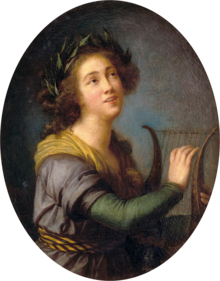Luísa Todi
| Luísa Rosa de Aguiar Todi | |
|---|---|

A painting of Luísa Todi, painted by Vigée Le Brun, 1785.
|
|
| Born | 9 January 1753 Setúbal, Kingdom of Portugal |
| Died |
1 October 1833 (aged 80) Lisbon, Kingdom of Portugal |
| Occupation | Mezzo-soprano opera singer |
Luísa Rosa de Aguiar Todi (1753–1833) was a popular and successful Portuguese mezzo-soprano opera singer.
Luísa Todi was born Luísa Rosa de Aguiar on 9 January 1753 in Setúbal, Portugal. In 1765, her family moved to Lisbon, where her father was a musical writer in the Theatre of Bairro Alto.
Luísa began her career as an actress in 1767 or 1768 in Molière's play Tartuffe. She met Francesco Saverio Todi, an Italian violinist, whom she married in 1769. After their marriage, on her husband's advice, she began having singing lessons with David Perez, an Italian composer and Music Master of the Portuguese Royal Chapel.
In 1770, she began her career as a singer with Giuseppe Scolari's opera Il Viaggiatore Ridicolo, in the Theatre of Bairro Alto. From 1772 to 1777, Luísa lived in Porto, where she was a singer and a singing teacher and where she began to be recognized as an artist of stature.
In the winter of 1777, at age 24, she gave her first performance abroad, at the King's Theatre in London. The enthusiastic critics said that "Mrs. Luísa Todi possesses high merit as singer and as actress."
In 1778 she sang at the famous Concerts Spirituels in Paris, winning a triumph and being considered the best foreign singer ever featured in France. She remained in France until 1780; then from 1780 to 1783, she sang at the Teatro Reggio in Turin and gave performances in Germany and Austria in 1781.
She returned to Paris for further Concerts Spirituels series, during which time a confrontation arose between Luísa Todi and the German soprano Gertrud Elisabeth Mara (1749–1833), which divided the public. Luísa Todi won this battle of rivals, being called by the French "the Nation's Singer".
...
Wikipedia
